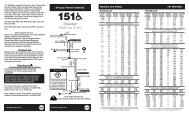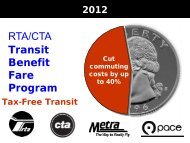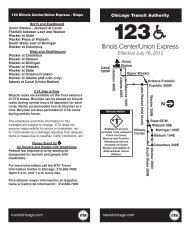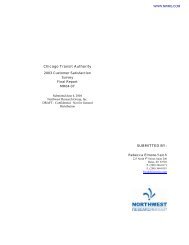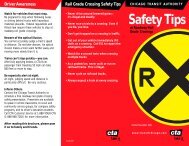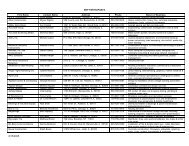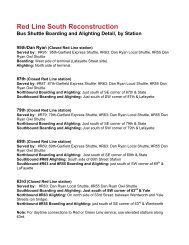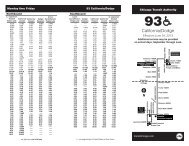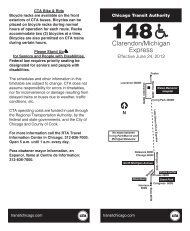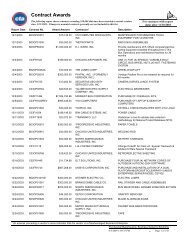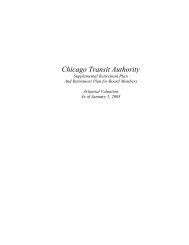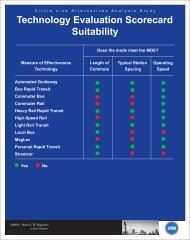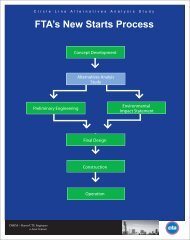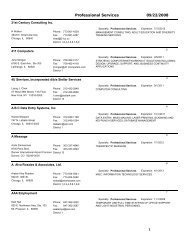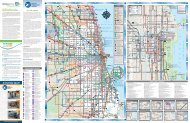Table Of Contents - Chicago Transit Authority
Table Of Contents - Chicago Transit Authority
Table Of Contents - Chicago Transit Authority
Create successful ePaper yourself
Turn your PDF publications into a flip-book with our unique Google optimized e-Paper software.
CTA Express Airport Train Service Business Plan<br />
<strong>Table</strong> 13: Estimate of Express Service Staffing Requirements – Full-time Employees<br />
Job Classification<br />
Required per<br />
Shift<br />
Total Required Comments<br />
Train Operator 9 30<br />
Terminal Supervisor 3 11<br />
O’Hare, 108 N. State Street,<br />
and Midway<br />
Line Manager 1 4 In Central Control<br />
Switchman 2 8 Two at Rosemont<br />
Servicer - Platform 3 12<br />
At Midway, 108 N. State<br />
Street, and O’Hare<br />
Servicer – Yards 6* 10 Midnight shift only at Midway<br />
Five positions (half inspection<br />
Repairer 5 12<br />
team at Midway on days), two<br />
positions, midnight shift only<br />
at Midway<br />
Customer Assistant<br />
3 12<br />
O’Hare, 108 N. State Street,<br />
and Midway<br />
Janitor 3 12<br />
O’Hare, 108 N. State Street,<br />
and Midway<br />
TOTAL 35 111<br />
Notes: “Total Required” considers limitations on length of work shift, report time and turn-in allowance (where<br />
applicable), seven days per week coverage requirements and the likely attraction of high-seniority staff to many of the<br />
positions associated with the premium service.<br />
*Number of positions per car estimated from 2006 CTA Budget Proposal; Yard Servicers are one shift per day, seven days<br />
per week.<br />
6.1.2 Phasing Options<br />
The Direct Service would have a round-trip time of around 170 minutes, including layovers and dwells.<br />
Therefore, to provide a 15-minute headway throughout the day would require 12 trainsets. Initially, it is<br />
anticipated that these would be 2-car consists, so a total of 24 cars are required to operate the scheduled<br />
service. As with the Express Service, three spare consists are also required; one each at Midway and<br />
Rosemont; with the third one being cycled through inspection at Midway Shop. In nearly every other<br />
respect, the Direct Service will parallel the operations and approach of the Express Service, as described<br />
more fully above. A detailed, complete operating-day schedule for the Direct Service should be<br />
developed, as the longer running time will impact available layover and dwell times.<br />
Balancing of the headways to provide for equipment cleaning and schedule recovery throughout the<br />
operating day is even more necessary with this service. Also, staffing requirements specific to the Direct<br />
Service should be considered. In particular, car miles on a daily basis will be different from those<br />
accumulated under the Express Service schedule, and this change may result in revised staffing for the<br />
repairmen classification, among others.<br />
It is possible that the transition from Direct to Express Service could proceed in a phased manner. For<br />
example, the improvements on the Blue Line (passing tracks and express tracks) would produce the<br />
greatest benefit in reducing running time (15 minutes), as well as serving the higher-demand market.<br />
Doing this work incrementally may also have benefits for the investment partners. From an operational<br />
51



